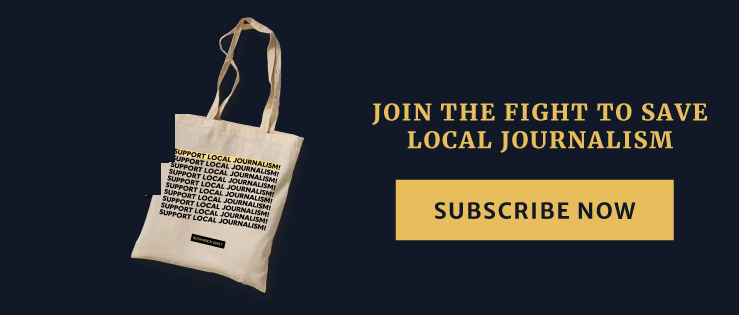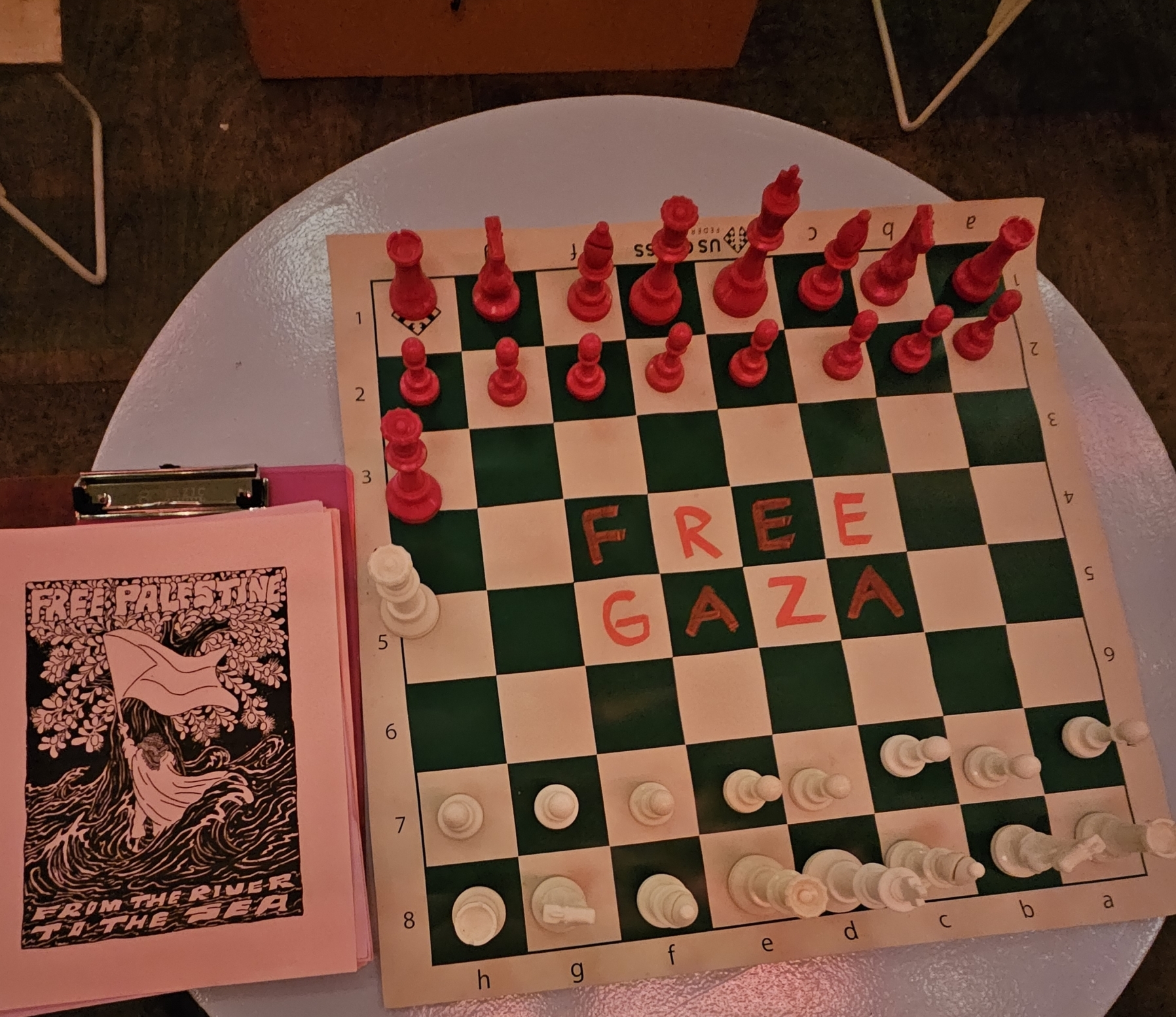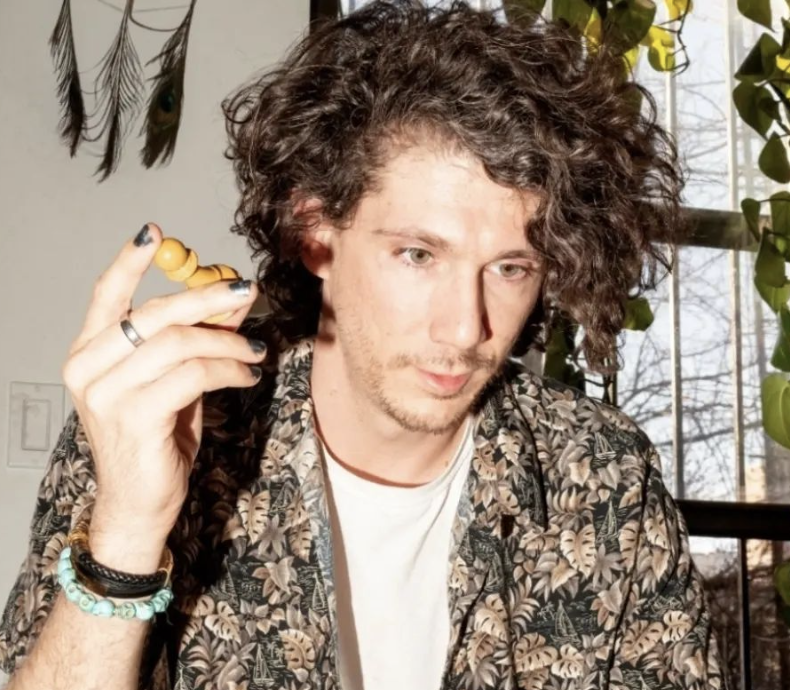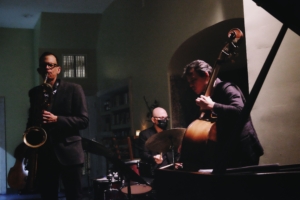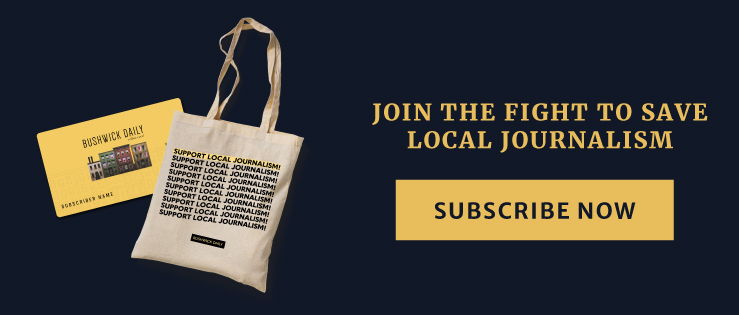
If dusty old men or frenzied children are the first things that come to mind when thinking of chess clubs, the opposite couldn’t be more true for Bushwick’s own Queers Gambit, which operates out of both the local bar Purgatory and Franklin Park in nearby Crown Heights, rotating biweekly every Thursday.
“People show up consistently. It hasn’t been long and we’re grounding ourselves as a pillar in the queer activity community,” Niki Cross, a team captain at Queers Gambit, tells me, after a slew of highly competitive blitz games with some of its regular players. Elliot Page, we’ve heard, happened to show up to the very same bar QG is hosting out of tonight, Franklin Park.
That night’s games play out in the outdoor seating area, with rows of pink, white and blue chess boards lined up and down, along with an art table that’s currently dedicated to “Free Palestine” posters. Cross runs the group alongside some of the other team captains, who include Azani Amarachi and Glo Liu, also a regular at Bushwick Chess meetups.
As Cross puts it, the colloquial idea of “no mansplaining’ is a big deal at a club that is trying to make itself home to queer and trans chess players who are not always made to feel comfortable playing at more traditional chess clubs.
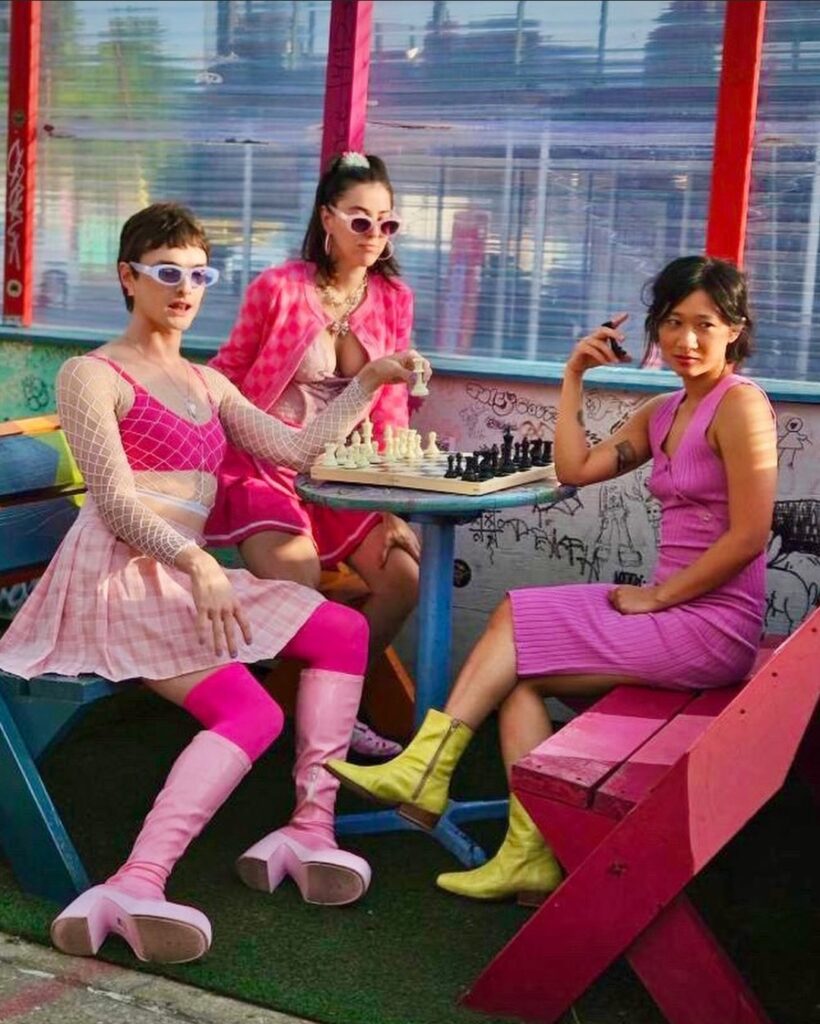
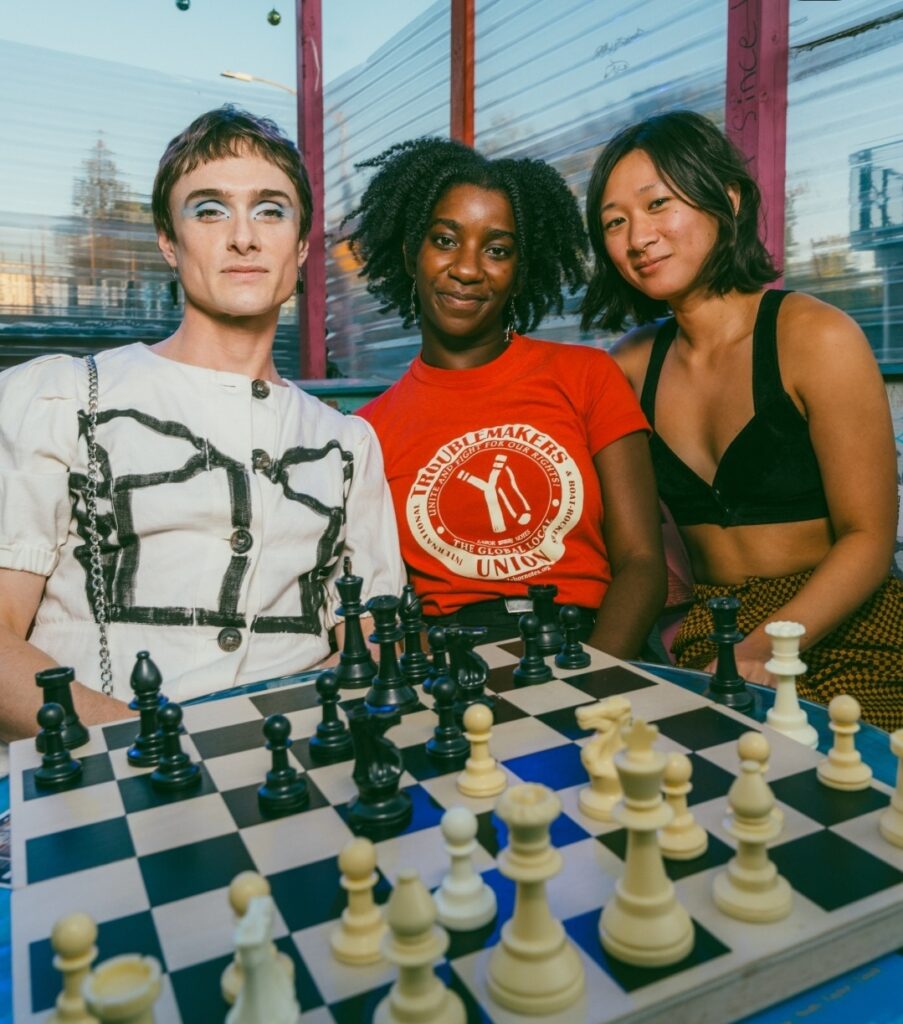

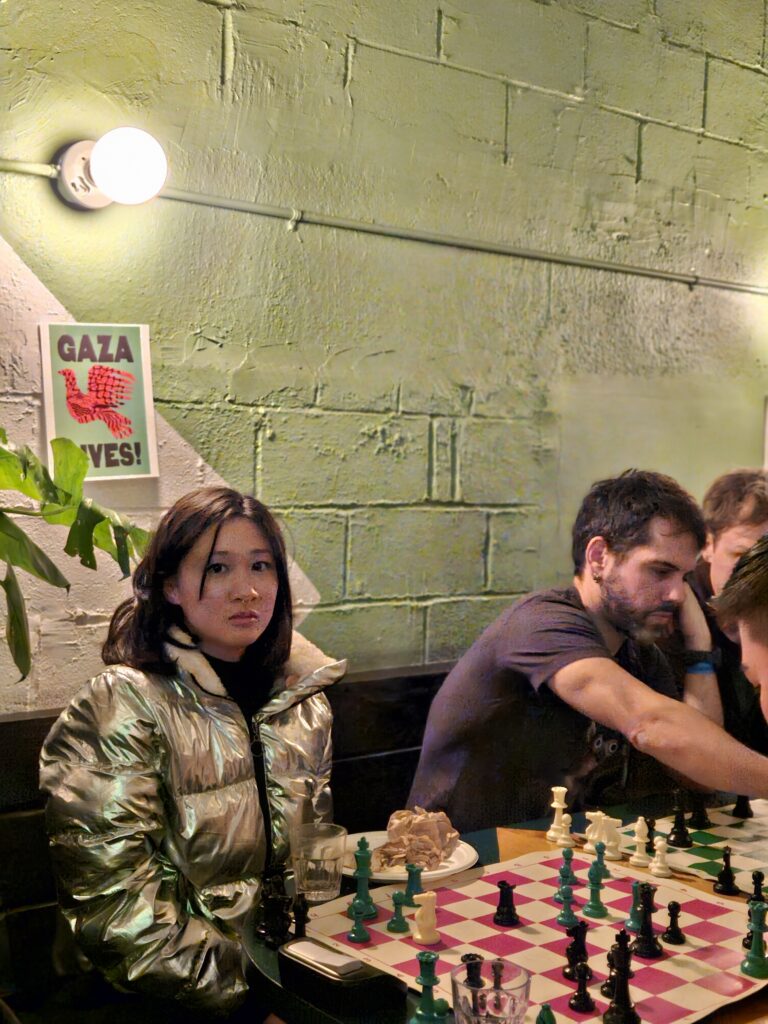
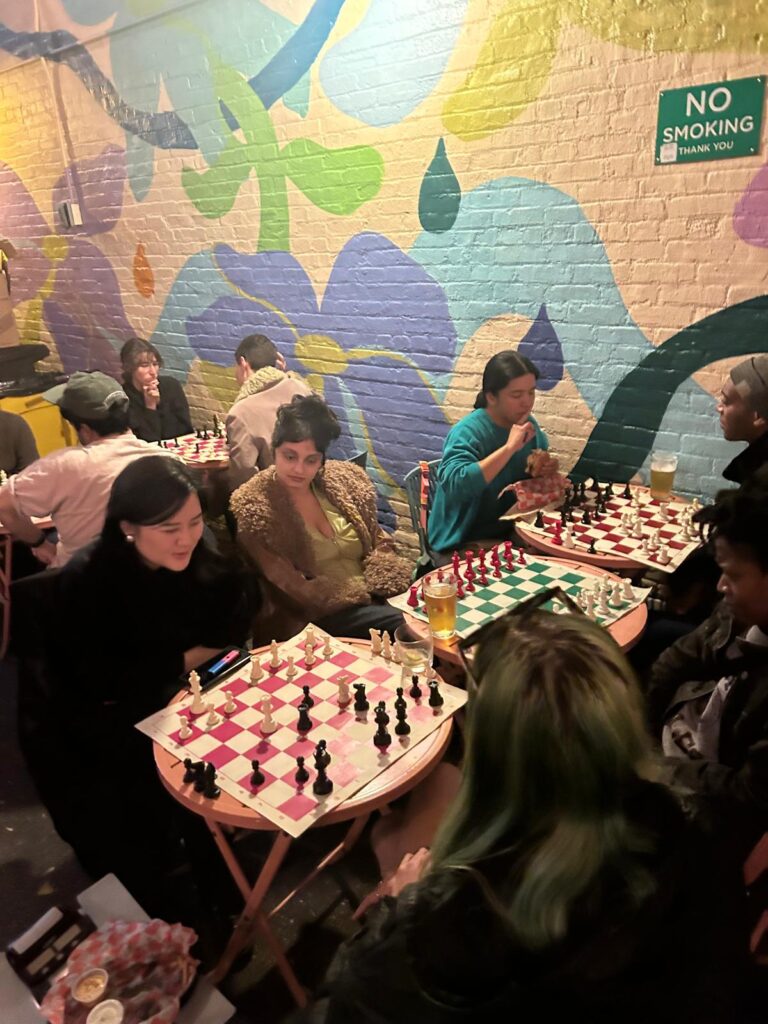
“Even just learning how to play is tough and intimidating in other spaces. Sometimes rude, sometimes misogynist or generally ignorant and transphobic.” Cross tells me. It’s a feeling known all too well to those active in the inner politics of the modern international chess world.
“So we try to be intentional if someone wants to learn particular things. We ask how they like to learn, or if they just want to play. I think people really enjoy that,” says Cross.
That night, a couple of players are gathering around a pop up flier table. “Yes, grab them, use them wisely,” Cross tells people picking up “Queers For Palestine” toolkits and fliers.
“To explain why we think ‘Queers for Palestine’ is important [it’s] because we are paying for genocide with our tax dollars and our representatives are shielding Israel from being held accountable. So, we feel personally responsible,” says Cross. “It is already political. We talk about queer shit. We raise money for Black Trans Liberation. BTL also knows how important Palestine is, they’ve been pushing so they’ve been a role model for what we’re doing. For me, it’s like everything is political.”
By day, Cross works as a pro bono environmental lawyer, work with an activist bent that goes hand in hand with their work running the ship at Queers Gambit. “I’m going to use whatever space I have to help. Specifically, people feel more comfortable that we’re talking openly. They came because they knew it was safe to raise the issue with us captains, it’s on all our minds already,” says Cross.
Outside of chess, the group cultivates art build nights and aims to provide a safe place to distribute tools for advocacy and more. Zines, action toolkits and resources bolster this among the overall chess community. Strategic, in its own right, the world of politics can feel double-sided in the chess world. Strategy, tactics, and coordination are three founding pillars of playing chess. In a way, Queers Gambit asks players if their skills as a chess player, quick with thought and advanced in sharp tactics, can make them leaders in their community.
Or as Cross puts it: “Yeah, organizing a chess space makes me more comfortable organizing a political space. Seeing other spaces, how do I fit in, who do I follow and how can I help?”
Glo Liu, another team captain in the group, told me that they think Queers Gambit offers a kind of healthy alternative for stagnation in radical change: “If you’re overwhelmed by what’s going on instead of looking away and putting your head in the sand, ground yourself in a community where you can work together. Actions, marches and working in space with each other is key.”
Cross tells me that the club has ambitious plans for where to take the club in the neighborhood.
“We’re doing some exciting stuff. When I moved to New York, I went to BodyHack for the first time, [it’s] a party led by and for trans women of color, indoor and outdoor space. We have to have chess here, I thought,” says Cross, who hosted an event there the last Thursday of November. “We’re trying to get Baba’s Olives involved. They’ve been advocating on behalf of Palestinian Liberation. We’re trying to link with Artists Against Apartheid to get them to run a tactics and Strategy session around how we advocate before we play chess.”
The event was indeed a success. I attended, along with many others for a night of chess and dancing, along with an opening of short films focused on Palestinian stories. Captain Glo Liu felt it was absolutely necessary for the movement. “The Bodyhack event was so beautiful. It was kind of the perfect, dreamy night. Chess, socializing and dancing.” says Liu, “The only thing missing was a sauna but the dance floor made due.”
With the itch to play more chess brewing, Cross lands the final blow. “Someone said, ‘the job of the writer is to make revolution irresistible.’ That should be the role of any artist or organizer because these are our modes of communication and gathering. This is how we get to know each other, work together and learn from one another. These are really important spaces and tools for things bigger than us.”
“It’s critical for healing,” says Cross, “Joy and pleasure don’t detract from the movement.”
Images taken by Micah Jameson for Bushwick Daily.
